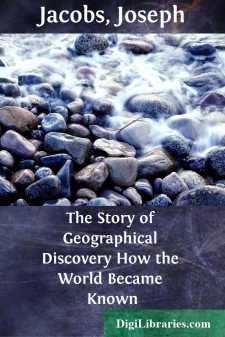Categories
- Antiques & Collectibles 13
- Architecture 36
- Art 48
- Bibles 22
- Biography & Autobiography 813
- Body, Mind & Spirit 142
- Business & Economics 28
- Children's Books 17
- Children's Fiction 14
- Computers 4
- Cooking 94
- Crafts & Hobbies 4
- Drama 346
- Education 46
- Family & Relationships 57
- Fiction 11829
- Games 19
- Gardening 17
- Health & Fitness 34
- History 1377
- House & Home 1
- Humor 147
- Juvenile Fiction 1873
- Juvenile Nonfiction 202
- Language Arts & Disciplines 88
- Law 16
- Literary Collections 686
- Literary Criticism 179
- Mathematics 13
- Medical 41
- Music 40
- Nature 179
- Non-Classifiable 1768
- Performing Arts 7
- Periodicals 1453
- Philosophy 64
- Photography 2
- Poetry 896
- Political Science 203
- Psychology 42
- Reference 154
- Religion 513
- Science 126
- Self-Help 84
- Social Science 81
- Sports & Recreation 34
- Study Aids 3
- Technology & Engineering 59
- Transportation 23
- Travel 463
- True Crime 29
The Story of Geographical Discovery How the World Became Known
by: Joseph Jacobs
Categories:
Description:
Excerpt
INTRODUCTION
How was the world discovered? That is to say, how did a certain set of men who lived round the Mediterranean Sea, and had acquired the art of recording what each generation had learned, become successively aware of the other parts of the globe? Every part of the earth, so far as we know, has been inhabited by man during the five or six thousand years in which Europeans have been storing up their knowledge, and all that time the inhabitants of each part, of course, were acquainted with that particular part: the Kamtschatkans knew Kamtschatka, the Greenlanders, Greenland; the various tribes of North American Indians knew, at any rate, that part of America over which they wandered, long before Columbus, as we say, "discovered" it.
Very often these savages not only know their own country, but can express their knowledge in maps of very remarkable accuracy. Cortes traversed over 1000 miles through Central Page 14 America, guided only by a calico map of a local cacique. An Eskimo named Kalliherey drew out, from his own knowledge of the coast between Smith Channel and Cape York, a map of it, varying only in minute details from the Admiralty chart. A native of Tahiti, named Tupaia, drew out for Cook a map of the Pacific, extending over forty-five degrees of longitude (nearly 3000 miles), giving the relative size and position of the main islands over that huge tract of ocean. Almost all geographical discoveries by Europeans have, in like manner, been brought about by means of guides, who necessarily knew the country which their European masters wished to "discover."
What, therefore, we mean by the history of geographical discovery is the gradual bringing to the knowledge of the nations of civilisation surrounding the Mediterranean Sea the vast tracts of land extending in all directions from it. There are mainly two divisions of this history—the discovery of the Old World and that of the New, including Australia under the latter term. Though we speak of geographical discovery, it is really the discovery of new tribes of men that we are thinking of. It is only quite recently that men have sought for knowledge about lands, apart from the men who inhabit them. One might almost say that the history of geographical discovery, properly so called, begins with Captain Cook, the motive of whose voyages was purely scientific curiosity. But before his time men wanted to know one another for two chief reasons: they wanted to Page 15 conquer, or they wanted to trade; or perhaps we could reduce the motives to one—they wanted to conquer, because they wanted to trade. In our own day we have seen a remarkable mixture of all three motives, resulting in the European partition of Africa—perhaps the most remarkable event of the latter end of the nineteenth century. Speke and Burton, Livingstone and Stanley, investigated the interior from love of adventure and of knowledge; then came the great chartered trading companies; and, finally, the governments to which these belong have assumed responsibility for the territories thus made known to the civilised world....





